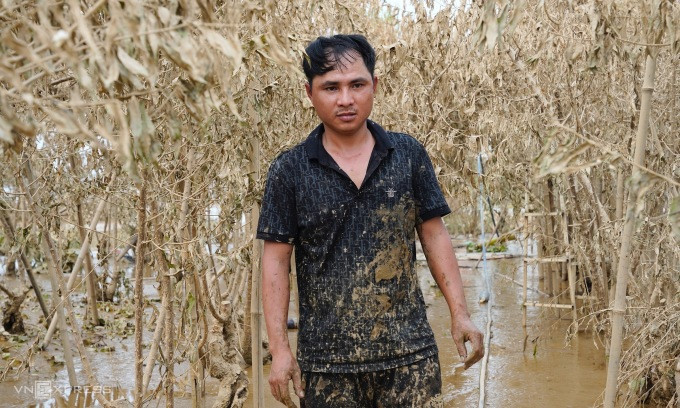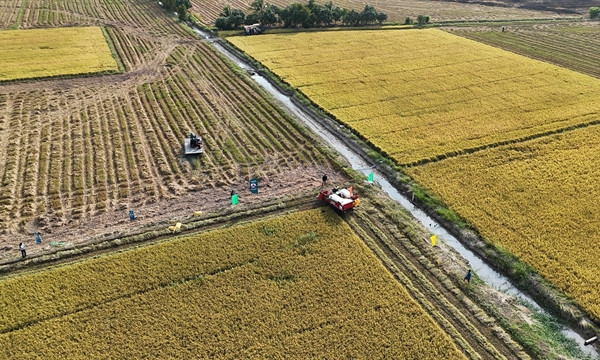Typhoon Yagi wrecks $1.6B damage to Vietnam: government
Yagi typhoon has caused damages worth VND40 trillion ($1.63 billion) in northern localities and might bring Vietnam’s 2024 GDP down by 0.15 percentage points from an earlier forecast, according to the government.
Yagi typhoon has caused damages worth VND40 trillion ($1.63 billion) in northern localities and might bring Vietnam’s 2024 GDP down by 0.15 percentage points from an earlier forecast, according to the government.
The typhoon – the strongest to hit Vietnam in 30 years – and the rain and flood that followed have affected 26 localities which together account for 41% of the country’s GDP and 40% of population, Minister of Planning and Investment Nguyen Chi Dung said at a government meeting Sunday.
The coastal city of Hai Phong alone suffered over VND10.8 trillion in damage, equivalent to 10% of its revenue last year. Quang Ninh Province, which was hit by the typhoon, incurred damages estimated at approximately VND23.77 trillion.
In northern localities, the typhoon destroyed 257,000 houses, 1,300 schools and broke 305 dikes, along with many other infrastructures.
Around 262,000 hectares of agriculture produce have been submerged and 2,250 aquaculture farms have been damaged. 2.3 million livestock and poultry have been perished, and 310,000 urban trees have been uprooted.
"GDP growth in Vietnam and many localities are forecast to slow down in the second half this year," Dung said.
GDP growth in the third quarter might drop 0.35 percentage points from an earlier forecast, and for the fourth quarter the decline might be 0.22 percentage points.
For the whole year, GDP could drop by 0.15 percentage points compared to the growth scenario proposed at the end of the second quarter (6.8-7%). Among the sectors, agriculture, forestry, and fisheries are expected to decline by 0.33 percentage points; industry and construction by 0.05 percentage points; and services by 0.22percentage points.
Some localities which were severely affected such as Hai Phong, Quang Ninh, Thai Nguyen and Lao Cai might see their regional GDP dropping by more than 0.5 percentage points.
Typhoon Yagi made landfall in the Gulf of Tonkin on the morning of Sept. 7, forcing nearly 13,000 households in Hai Phong, Quang Ninh and Thai Binh to evacuate urgently.
The storm caused widespread power, water, and communication outages. Some areas remain flooded, and the risk of landslides can lead to further severe damage.
Industrial and construction enterprises were also affected by the storm due to power and communication disruptions. Many essential infrastructure projects, roads, bridges, power grids, water supply systems, and schools were severely damaged.
Prime Minister Pham Minh Chinh has ordered the planning ministry to present a resolution on responding to the impact of Yagi by Monday.
The ministry should request for policies that will restore economic activities, control inflation and promote growth, he added.
Chinh has also listed out six tasks and solutions, including policy groups, to help residents and businesses recover their production and business activities.
He instructed the banking sector to research policies on debt rescheduling and to offer zero-interest loans to borrowers affected by the typhoon.
The Social Policy Bank should provide loans to families and insurers must promptly compensate businesses and individuals for their losses, he ordered.
The Ministry of Finance was assigned to study tax and fee reductions and delays. The Ministry of Industry and Trade should ensure the supply of materials and inputs for production.
This year, the government set a target of keeping inflation below 4.5% and achieving a GDP growth rate of around 7%.
To boost growth, the PM has called for an increase in public investment and efforts to combat corruption and profiteering.
Ministries and sectors must ensure the adequate supply of goods and materials for production and business, control prices, prevent hoarding and price hikes, and refrain from exploiting the difficult situation for profit.
Agencies are also encouraged to develop mechanisms and policies that incentivize breakthrough growth in certain areas, such as semiconductors, free trade zones, and financial centers.






